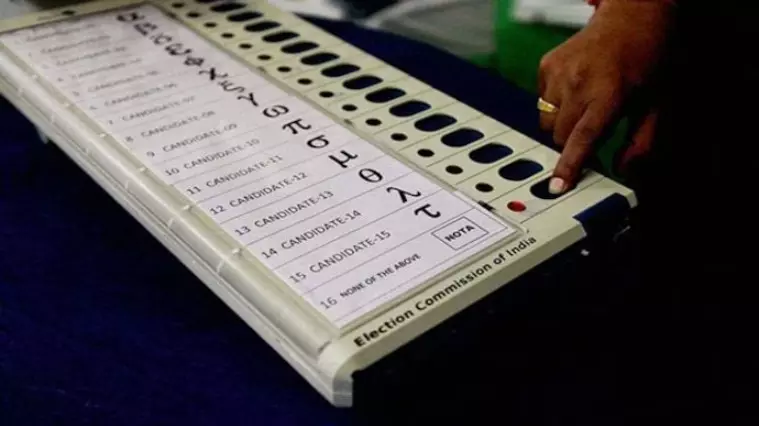Phase 1 nominations end; NDA shows confidence, INDIA bloc in confusion

Patna: Bihar plunged into election fever on Friday as nomination filings for the first phase of the Assembly elections concluded, highlighting a stark contrast between the ruling NDA’s disciplined campaign and the disarray within the Opposition INDIA bloc.
According to the Election Commission, over 1,250 candidates filed their nomination papers for the 121 constituencies scheduled to go to polls on November 6. The final tally was expected to rise as returns from all districts were yet to be fully received.
The Opposition alliance, comprising the RJD, Congress, three Left parties, and Mukesh Sahani’s Vikassheel Insaan Party (VIP), appears to be struggling with internal coordination. In at least six constituencies, multiple INDIA bloc candidates filed nominations, setting the stage for potential “friendly fights” unless one of the contenders withdraws by the October 20 deadline.
While the Congress agreed to let RJD leader Rishi Mishra contest from the Jale seat on its symbol, the regional heavyweight RJD did not reciprocate in Lalganj. There, Shivani Shukla, daughter of former local don-turned-politician Munna Shukla, filed her nomination against Aditya Kumar Raja, the Congress nominee. Similar face-offs appear imminent in Vaishali and Kahalgaon.
Congress is also poised to compete against CPI candidates in at least three constituencies: Bachhwara, Rajapakar, and Rosera. Meanwhile, the VIP, despite earlier reports of dissatisfaction with seat-sharing arrangements, remains part of the coalition but may field candidates against the RJD in Tarapur and Gaura Bauram. Sahani, whose party won four seats in 2020 but who lost his own, has opted out of contesting personally. Speaking to journalists, he said, “It is not that I want to enter Rajya Sabha. I want the INDIA bloc to form the next government with me as the Deputy Chief Minister.”
The first phase will also determine the fate of prominent leaders, including RJD’s de facto chief ministerial candidate Tejashwi Yadav, seeking a third consecutive term from Raghopur. On the NDA side, Deputy Chief Ministers Samrat Choudhary (Tarapur) and Vijay Kumar Sinha (Lakhisarai), along with ministers Mangal Pandey (BJP) and Vijay Kumar Chaudhary (JDU), are also in the fray.
The BJP launched a high-intensity campaign, with Union Home Minister Amit Shah addressing a rally in Saran district, followed by a “buddhijivi sammelan” (conclave of intellectuals) in Patna. Speaking at the event, Shah likened the state’s situation under the RJD, which was voted out 20 years ago, to “a pothole we have been able to fill up, with the resolve to build a fine structure in the next five years.” He further accused the Congress-RJD combine of offering patronage to “criminals and infiltrators from foreign countries” and urged voters to prevent “Lalu Prasad, whom you ousted from power in 2005, from coming back.”
Shah also visited Chief Minister Nitish Kumar at his residence for a courtesy call, quelling rumours of JD(U) discontent over the seat-sharing arrangement. Earlier, he had asserted in a television interview that the NDA was contesting under Kumar’s leadership, and that it did not matter if the BJP won more seats than the JD(U), given the NDA’s numerical advantage in the assembly. JD(U) leaders welcomed the statement, though RJD and Congress representatives noted that Shah had not definitively confirmed that Kumar would continue as CM if the NDA retained power.
The campaign has drawn support from several BJP-ruled states, with Chief Ministers Devendra Phadnavis (Maharashtra), Mohan Yadav (Madhya Pradesh), Pramod Sawant (Goa), Pushkar Singh Dhami (Uttarakhand), and Mohan Manjhi (Odisha) touring districts, backing NDA candidates during the filing of nominations, and addressing public gatherings.
Within the NDA, the BJP and JD(U) have agreed to contest 101 seats each out of the 243-member Assembly. The remaining seats have been allocated to smaller allies, including the Lok Janshakti Party (Ram Vilas) led by Union Minister Chirag Paswan, Hindustani Awam Morcha led by Union Minister Jitan Ram Manjhi, and Rashtriya Lok Morcha of Rajya Sabha MP Upendra Kushwaha.
As November 6 approaches, the contrast between the NDA’s organised mobilisation and the INDIA bloc’s internal confusion is likely to shape the first phase of Bihar’s pivotal Assembly elections. With heavyweights from both sides in the fray, the outcome of these constituencies will offer a key indicator of political momentum ahead of subsequent phases.



